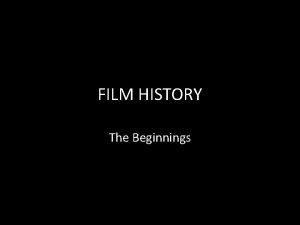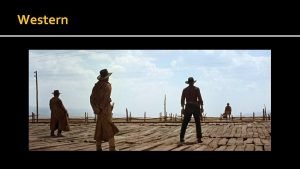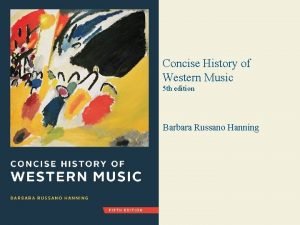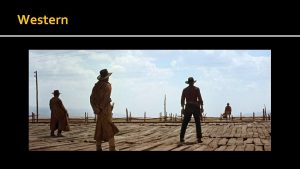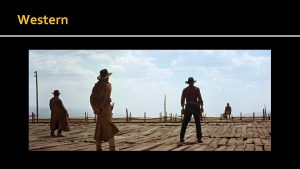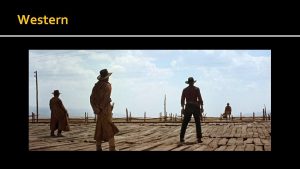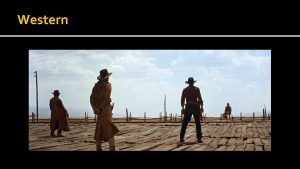Western History of the Western film The Western









- Slides: 9

Western

History of the Western film � � � � The Western was very unique to genre to America, and was consistently successful for over 50 years Edwin S. Porter’s ‘The Great Train Robbery’ (1903) is considered the first true western, and the main themes were that of escape and defeating the ‘bad guy’. John Ford directed “Stagecoach” in 1939 and, apart from winning two Oscars, started a new era of Western films that were made not just for children, but wider audiences as well. The 1950’s saw the rise of stars like John Wayne, Jimmy Stewart and Gary Copper during what is considered the ‘golden age’ of western films. The 1960’s saw the rise of ‘Spaghetti Westerns’. Due to dwindling popularity in America, Westerns found new audiences in Italy, leading to allot of Italian produced films that would later get the title ‘Spaghetti Westerns’. These were the most popular Westerns at the time. Despite this, the genre was still loosing appeal, and to compensate for this, directors tried to add different elements to their westerns, such as comedy or more graphic scenes. Despite this, the genre still lost interest and ultimately, direction. Modern Westerns are still made, and they seem to have adapted into movies more seen as being in the action genre, like American cop movies, but it certainly isn’t gone for good.

Sub-Genres of the Western film �Civil War �Gunfighter �Indian War �Humorous/Parody �Spaghetti Western �Epic Western �Australian

Iconography of the Western film �Stetson hat �Revolvers �Rifles �Cowboy Boots �Sand �Tumbleweed �Wooden Signs �Bandannas

Actors/Directors associated with Western films �John Wayne (A) �Jimmy Stewart (A) �Gary Cooper (A) �Clint Eastwood (A) �Marlene Dietrich (A) �Barbara Stanwyck (A) �Haley Bennet (A) �Virginia Mayo (A) �Katy Jurado (A) �John Ford (D) �Edwin S. Porter (D) �Howard Hawkes (D) �Anthony Mann (D) �Delmer Daves (D) �Budd Boetticher (D) �John Sturges (D) �Robert Aldrich (D)

Box Office – Top 10 films of the Genre 1. 2. 3. 4. 5. 6. 7. 8. 9. 10. Dances with Wolves The Revenant True Grit Django Unchained Rango Wild West Maverick Unforgiven Cowboys and Aliens The Magnificent Seven (2016)

Budgets – Top 10 films of the Genre

Critically acclaimed examples �The Treasure of Sierra Madre (1948) �The Good, the Bad and the Ugly (1966) �High Noon (1952) �The Searchers (1956) �Rio Bravo (1959) �Once Upon a Time in the West (1968) �Unforgiven (1992) �True Grit (2010) �A Fistful of Dollars (1964) �Blazing Saddles (1974)

Stretch and Challenge: Ideologies/Contexts � Early Westerns mainly depict white American outlaws or ‘cowboys’ fighting against Native Americans, and though the Americans were the aggressors, the Native Americans were commonly seen as the ‘bad guys’. As times moved on, this view changed, and some films depicted some Native Americans in a better light – but the traditional view of the early films was still prominent in later examples. Although a spoof comedy of the Western genre, ‘Blazing Saddles’ directed by Mel Brookes is an example of social and political commentary in a Western. This is because the story is one of discrimination against the new sheriff because he is black, and his story in getting people’s acceptance: not just for himself, but the whole of the black community. This was a reflection of American stigma towards black Americans, which still remains today, and how Mel Brookes thought it was so amusing that someone could be discriminated against simply because of the colour of their skin, that he made a comedy Western about it.
 Explain wedge film and squeeze film journal bearings
Explain wedge film and squeeze film journal bearings Western film characteristics
Western film characteristics Film history timeline
Film history timeline History of film photography
History of film photography History of the western genre
History of the western genre History of western drama
History of western drama Concise history of western music 5th edition
Concise history of western music 5th edition Chapter 10 ap world history
Chapter 10 ap world history Western theatre history
Western theatre history History of western theatre
History of western theatre



